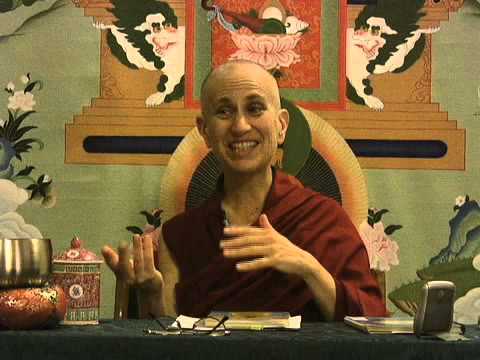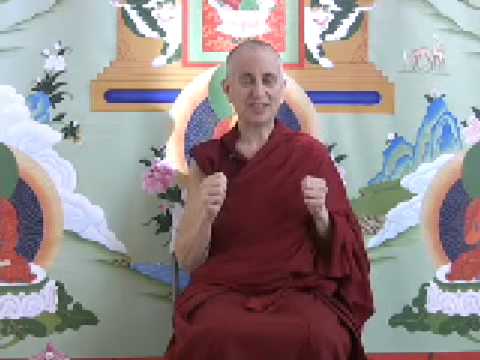Verse 30-1: Happiness
Verse 30-1: Happiness
Part of a series of talks on the 41 Prayers to Cultivate Bodhicitta from the Avatamsaka Sutra (the Flower Ornament Sutra).
- The way to think about dissatisfaction with samsara
- How the happiness of the buddhas is different from sense pleasure happiness
- Turning our minds toward buddhahood in order to be of greatest benefit to others
41 Prayers to cultivate bodhicitta: Verse 30-1 (download)
- Questions and answers
41 Prayers to cultivate bodhicitta: Verse 30-1 Q&A (download)
We did,
“May all sentient beings be dissatisfied with worldly phenomena.”
This is the prayer of the bodhisattva when seeing someone sad.
The next one is,
“May all beings win the bliss of a buddha.”
This is the prayer of the bodhisattva when seeing someone happy.
We have dissatisfaction with worldly phenomena, not because we still are craving for them and wanting them to be the be all and end all that we expected them to be. That’s what makes us miserable, when we’re still holding on to them, saying, “I know they’re not going to bring me any happiness, but I want them to and they’ve got to.” That’s what really makes us quite miserable. We have to give up that craving for them and that expectation that they’re going to come through with any kind of happiness, and instead turn the mind to seek the bliss of a buddha.
The bliss of a buddha is a completely different kind of happiness. They say it’s a completely different kind of experience than sense pleasure happiness. As we’ve talked about, sense pleasure happiness is called the dukkha of change. Why? Because it isn’t by it’s own nature happiness. If it were, the more you did it, the happier you would be. But the more you eat, the fuller you get, the more uncomfortable you get, and it’s like that with any sense pleasure.
Whereas the bliss of a buddha doesn’t transform into something uncomfortable after a while. The bliss of a buddha, it goes along with a buddha’s realizations of body, speech and mind. It’s a whole process of transforming the body, transforming the speech, transforming the mind. When you follow the path of an arhat, you have a mind that is blissful but your body is still seen as a contaminated body and will experience pain. That’s how it’s presented in the Pali scriptures. In the Mahayana scriptures, if you become a bodhisattva at the level of an arya bodhisattva, the path of seeing, then you don’t experience any more physical pain either.
Those high bodhisattvas, plus the Buddha, they have the physical bliss plus the mental bliss. So double whopper. [laughter] This is what we’re turning our mind towards. When we turn our mind towards the bliss of a buddha, we’re doing it not just for ourselves but because that bliss comes along with the realizations that will enable us to be of the maximum benefit to everybody. Here we see quite clearly—I’m saying this for the mind that still has this old remnant leftover that, “Happiness is bad and I’m sinful if I feel happy or pleasurable,”—here we see quite clearly, no, a buddha and these high level bodhisattvas experience this incredible level of bliss and they enjoy it, but the way they enjoy it is probably quite different from the way we enjoy pleasure. [laughter]
We’ve been talking about when we enjoy something there’s this [both hands grasping tightly] attached to it—not wanting it to end, wanting it to get more, dissatisfied that it wasn’t good enough. But the way the buddhas have it is just this experience of bliss that doesn’t decline at all. To get that experience of bliss, we have to go through the dissatisfaction with worldly pleasure. It’s like, to get out of prison, you have to get fed up with prison. To want “triple-A” grade happiness, you have to realize the faults of “single-A” grade happiness.
That’s what we’re all going for aren’t we? It’s possible. There are beings who’ve attained it and they’ve described to us the path to follow. If we follow that path, we’ll end up with the same result.
Audience: I was reading in the Lamrim Chenmo, that if the afflictions are really the things to overcome, then even though with negative karma, the seeds of karma might still be there, if the afflictions were gone, there is no condition for that karma to ripen. It made me wonder about the arhats experience.
Venerable Thubten Chodron (VTC): If the afflictions are gone, there’s no condition for the negative karma to ripen. That’s for the negative karma that causes rebirth in samsara to ripen. That’s why arhats can’t be reborn. To have the negative karma that has the potency to propel a rebirth ripen, you need craving and grasping and you need ignorance. When that’s been abolished, those karmas can’t ripen. At least they can’t ripen in rebirth. They might ripen in other ways or other kinds of karma might ripen. They do have painful feelings, at least according to the Pali scriptures. I’ll have to see. I think the Mahayana said the same thing about the arhats.
Interestingly, the Pali scriptures said that even the Buddha will experience physical pain because there’s a story of the Buddha stepping on a thorn and experiencing pain with his body but not with his mind. That’s because, according to the Pali presentation, the Buddha was an ordinary being when he appeared 2,500 years ago, so his body at that time was a product of afflictions and karma. Even though the mind became liberated, the body wasn’t, so the body could still experience pain.
From a Mahayana viewpoint, Shakyamuni Buddha actually attained enlightenment a while ago, but appeared as an ordinary being in this life in order to show us through example of the whole process of how he did of having sense pleasure and renouncing and practicing and doing all these things. The two traditions are coming from different views of who Shakyamuni Buddha was. That’s also going to influence how they see the Buddha’s body and if the Buddha experiences physical pain or not.
Audience: What kind of pain would arhats be feeling?
VTC: Well, if they stepped on a thorn, something like that, it’s physical pain. If somebody swore at them, they wouldn’t feel pain because of somebody criticizing them, because that’s mental pain. It would be physical pain because the body is still considered a true suffering. Whereas when you reach the state of an arya bodhisattva, then you have the ability to manifest many many different bodies. I think it’s because of your merit, you don’t experience physical pain because of your wisdom you don’t experience mental pain, I think that’s how it is. Sounds good huh?
Even the lower level bodhisattvas, if they have physical pain, then they would practice, as it tells us to practice in the Lama Chopa, to see it as the ripening of negative karma and therefore say, “Good, I’m glad this is happening.” In that way, you might have physical pain but you don’t have the mental pain. If we look at our experience, mental pain is a huge one and mental pain really increases the physical pain, big time.
Venerable Thubten Chodron
Venerable Chodron emphasizes the practical application of Buddha’s teachings in our daily lives and is especially skilled at explaining them in ways easily understood and practiced by Westerners. She is well known for her warm, humorous, and lucid teachings. She was ordained as a Buddhist nun in 1977 by Kyabje Ling Rinpoche in Dharamsala, India, and in 1986 she received bhikshuni (full) ordination in Taiwan. Read her full bio.


